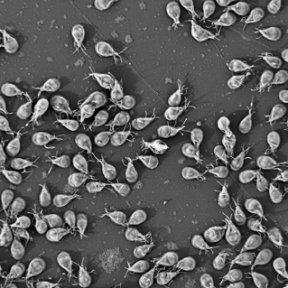Giardia Bares All: Parasite genes reveal long sexual history
While it hasn’t yet been caught in the act, a single-celled parasite has been ready for sex for billions of years. A new research finding provides evidence that sexual reproduction started as soon as life forms that have nuclei and organelles within their cells branched off from their structurally simpler ancestors.

The parasite Giardia intestinalis is well known for causing a diarrheal disease that animals and people contract after drinking contaminated water. Many researchers consider this species to be one of the most ancient living members of the eukaryote, or true nucleus, lineage. However, unlike most eukaryotes, G. intestinalis and its relatives have been long considered to reproduce only asexually—by division into two identical cells.
To determine when reproduction via sperm and eggs originated, John Logsdon of the University of Iowa in Iowa City and his colleagues took a close look at G. intestinalis‘ mysterious reproductive life. They focused on the hallmark of sexual reproduction known as meiosis, the process that halves the number of an organism’s chromosomes to make gametes such as sperm and eggs. Among available data on the G. intestinalis genome, the researchers searched for genes similar to those that control meiosis in other eukaryotes, including plants, animals, and fungi.
The researchers’ analysis revealed that G. intestinalis possesses genes similar to those used for meiosis by other eukaryotes. At least 5 of those genes function only in meiosis, and 10 others have roles both in meiosis and other functions, Logsdon’s team noted in the Jan. 26 Current Biology.
Although the researchers didn’t establish that G. intestinalis reproduces sexually, Logsdon notes that a discreet sex life might turn up after further study. “Lack of evidence is not evidence of lack,” he says.
On the other hand, the findings suggest that meiosis was established early in eukaryotic evolution, making sexual reproduction “a very central feature of being a eukaryote,” says Logsdon. Bacteria and other simple-celled life forms, or prokaryotes, don’t make eggs and sperm.
All living eukaryotes, including G. intestinalis, share numerous cellular features and processes that aren’t seen in prokaryotes. According to Andrew Roger of Dalhousie University in Halifax, Nova Scotia, establishing that all eukaryotes are capable of meiosis could “make the evolutionary transition from prokaryote to eukaryote even more difficult to sort out.
“A lot had to happen when eukaryotes evolved. Why aren’t there any intermediate stages of this process alive today? Did all the intermediate forms go extinct, and why?” Roger asks.
Logsdon says that he and his team plan to continue their research by looking for meiosis genes in other eukaryotes thought to be asexual.